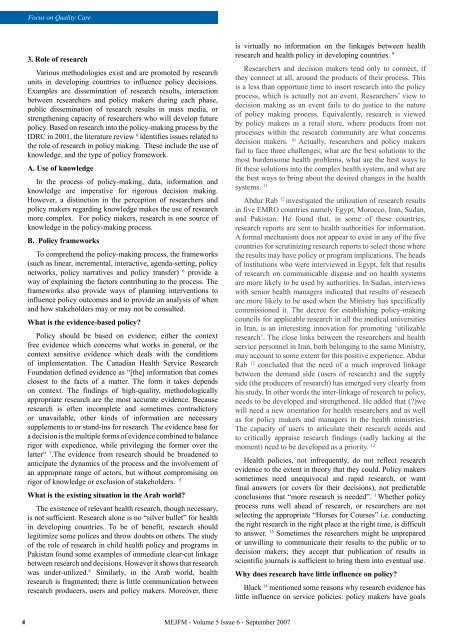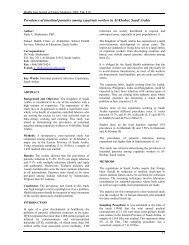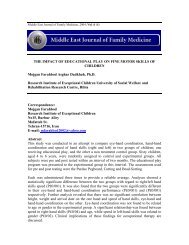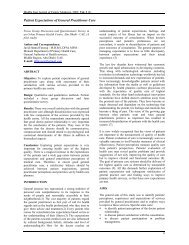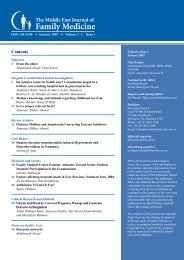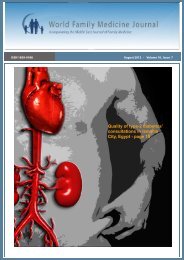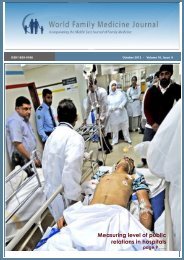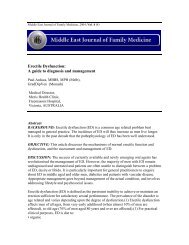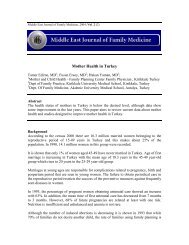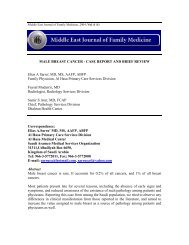Contents - Middle East Journal of Family Medicine
Contents - Middle East Journal of Family Medicine
Contents - Middle East Journal of Family Medicine
- No tags were found...
You also want an ePaper? Increase the reach of your titles
YUMPU automatically turns print PDFs into web optimized ePapers that Google loves.
Focus on Quality Care<br />
3. Role <strong>of</strong> research<br />
Various methodologies exist and are promoted by research<br />
units in developing countries to influence policy decisions.<br />
Examples are dissemination <strong>of</strong> research results, interaction<br />
between researchers and policy makers during each phase,<br />
public dissemination <strong>of</strong> research results in mass media, or<br />
strengthening capacity <strong>of</strong> researchers who will develop future<br />
policy. Based on research into the policy-making process by the<br />
IDRC in 2001, the literature review 6 identifies issues related to<br />
the role <strong>of</strong> research in policy making. These include the use <strong>of</strong><br />
knowledge, and the type <strong>of</strong> policy framework.<br />
A. Use <strong>of</strong> knowledge<br />
In the process <strong>of</strong> policy-making, data, information and<br />
knowledge are imperative for rigorous decision making.<br />
However, a distinction in the perception <strong>of</strong> researchers and<br />
policy makers regarding knowledge makes the use <strong>of</strong> research<br />
more complex. For policy makers, research is one source <strong>of</strong><br />
knowledge in the policy-making process.<br />
B. Policy frameworks<br />
To comprehend the policy-making process, the frameworks<br />
(such as linear, incremental, interactive, agenda-setting, policy<br />
networks, policy narratives and policy transfer) 6 provide a<br />
way <strong>of</strong> explaining the factors contributing to the process. The<br />
frameworks also provide ways <strong>of</strong> planning interventions to<br />
influence policy outcomes and to provide an analysis <strong>of</strong> when<br />
and how stakeholders may or may not be consulted.<br />
What is the evidence-based policy<br />
Policy should be based on evidence; either the context<br />
free evidence which concerns what works in general, or the<br />
context sensitive evidence which deals with the conditions<br />
<strong>of</strong> implementation. The Canadian Health Service Research<br />
Foundation defined evidence as “[the] information that comes<br />
closest to the facts <strong>of</strong> a matter. The form it takes depends<br />
on context. The findings <strong>of</strong> high-quality, methodologically<br />
appropriate research are the most accurate evidence. Because<br />
research is <strong>of</strong>ten incomplete and sometimes contradictory<br />
or unavailable, other kinds <strong>of</strong> information are necessary<br />
supplements to or stand-ins for research. The evidence base for<br />
a decision is the multiple forms <strong>of</strong> evidence combined to balance<br />
rigor with expedience, while privileging the former over the<br />
latter“ 7 .The evidence from research should be broadened to<br />
anticipate the dynamics <strong>of</strong> the process and the involvement <strong>of</strong><br />
an appropriate range <strong>of</strong> actors, but without compromising on<br />
rigor <strong>of</strong> knowledge or exclusion <strong>of</strong> stakeholders. 5<br />
What is the existing situation in the Arab world<br />
The existence <strong>of</strong> relevant health research, though necessary,<br />
is not sufficient. Research alone is no “silver bullet” for health<br />
in developing countries. To be <strong>of</strong> benefit, research should<br />
legitimize some polices and throw doubts on others. The study<br />
<strong>of</strong> the role <strong>of</strong> research in child health policy and programs in<br />
Pakistan found some examples <strong>of</strong> immediate clear-cut linkage<br />
between research and decisions. However it shows that research<br />
was under-utilized. 8 Similarly, in the Arab world, health<br />
research is fragmented; there is little communication between<br />
research producers, users and policy makers. Moreover, there<br />
is virtually no information on the linkages between health<br />
research and health policy in developing countries. 9<br />
Researchers and decision makers tend only to connect, if<br />
they connect at all, around the products <strong>of</strong> their process. This<br />
is a less than opportune time to insert research into the policy<br />
process, which is actually not an event. Researchers’ view to<br />
decision making as an event fails to do justice to the nature<br />
<strong>of</strong> policy making process. Equivalently, research is viewed<br />
by policy makers as a retail store, where products from not<br />
processes within the research community are what concerns<br />
decision makers. 10 Actually, researchers and policy makers<br />
fail to face three challenges; what are the best solutions to the<br />
most burdensome health problems, what are the best ways to<br />
fit these solutions into the complex health system, and what are<br />
the best ways to bring about the desired changes in the health<br />
systems. 11<br />
Abdur Rab 12 investigated the utilization <strong>of</strong> research results<br />
in five EMRO countries namely Egypt, Morocco, Iran, Sudan,<br />
and Pakistan. He found that, in some <strong>of</strong> these countries,<br />
research reports are sent to health authorities for information.<br />
A formal mechanism does not appear to exist in any <strong>of</strong> the five<br />
countries for scrutinizing research reports to select those where<br />
the results may have policy or program implications. The heads<br />
<strong>of</strong> institutions who were interviewed in Egypt, felt that results<br />
<strong>of</strong> research on communicable disease and on health systems<br />
are more likely to be used by authorities. In Sudan, interviews<br />
with senior health managers indicated that results <strong>of</strong> research<br />
are more likely to be used when the Ministry has specifically<br />
commissioned it. The decree for establishing policy-making<br />
councils for applicable research in all the medical universities<br />
in Iran, is an interesting innovation for promoting ‘utilizable<br />
research’. The close links between the researchers and health<br />
service personnel in Iran, both belonging to the same Ministry,<br />
may account to some extent for this positive experience. Abdur<br />
Rab 12 concluded that the need <strong>of</strong> a much improved linkage<br />
between the demand side (users <strong>of</strong> research) and the supply<br />
side (the producers <strong>of</strong> research) has emerged very clearly from<br />
his study. In other words the inter-linkage <strong>of</strong> research to policy,<br />
needs to be developed and strengthened. He added that ()we<br />
will need a new orientation for health researchers and as well<br />
as for policy makers and managers in the health ministries.<br />
The capacity <strong>of</strong> users to articulate their research needs and<br />
to critically appraise research findings (sadly lacking at the<br />
moment) need to be developed as a priority. 12<br />
Health policies, not infrequently, do not reflect research<br />
evidence to the extent in theory that they could. Policy makers<br />
sometimes need unequivocal and rapid research, or want<br />
final answers (or covers for their decisions), not predictable<br />
conclusions that “more research is needed”. 1 Whether policy<br />
process runs well ahead <strong>of</strong> research, or researchers are not<br />
selecting the appropriate “Horses for Courses” i.e. conducting<br />
the right research in the right place at the right time, is difficult<br />
to answer. 13 Sometimes the researchers might be unprepared<br />
or unwilling to communicate their results to the public or to<br />
decision makers; they accept that publication <strong>of</strong> results in<br />
scientific journals is sufficient to bring them into eventual use.<br />
Why does research have little influence on policy<br />
Black 14 mentioned some reasons why research evidence has<br />
little influence on service policies: policy makers have goals<br />
4<br />
MEJFM - Volume 5 Issue 6 - September 2007


